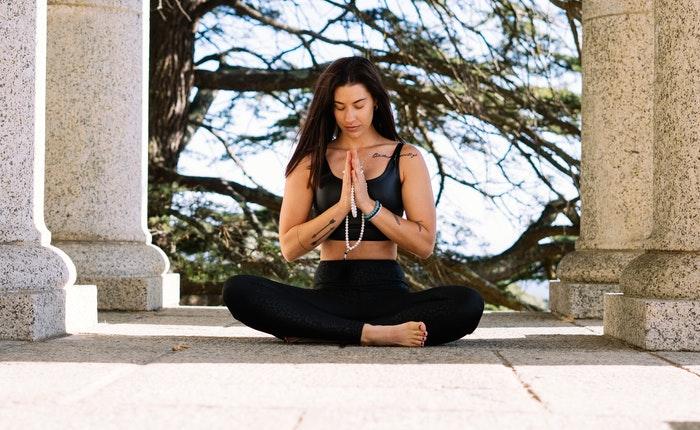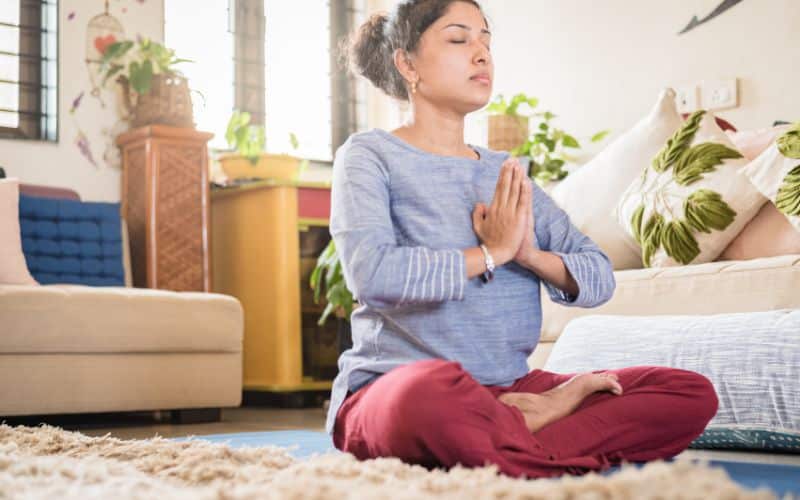It's a frequently asked question with an extremely varied set of answers! Perhaps we should ask ourselves, “IS there a best time to meditate?”. Better yet, “when is the best time for me to meditate?”
Meditation has proven to be helpful in all areas of well-being. It can mitigate chronic pain, reduce addictive tendencies, and bring more clarity and joy into our lives. Finding time in our day to have a consistent meditation practice proves beneficial to our mental and physical health. Well-known Buddhist monk, Ajahn Amaro, said “If you have time to breathe you have time to meditate. You breathe when you walk. You breathe when you stand. You breathe when you lie down.” He is implying that meditation can be done at all times. Knowing this, it’s important to reflect upon when meditation can fit into our unique schedule. This way we don’t have to live up to the pressure of meditating at the “perfect time”...which there isn't any.
That being said, each time of day comes with its assets. In this article, we will dive into the benefits of different windows of time for meditation. We hope this inspires you to pick a dedicated slot for the deepening of your meditation practice.

Important Factors For Choosing A Time To Meditate
Are you wondering when you should meditate? Here are several points to consider. It is important to brainstorm the advantages that certain hours of the day hold for your practice!
Personal schedule
Lay out your typical day on paper and take note of the gaps. Consistent meditation can sometimes depend on your schedule. You might want to meditate in the morning, but perhaps you have many things that occupy your time before work. If you want to keep the same time every day, choose a realistic time. This way you can avoid feelings of discouragement when you try to achieve an ideal time.
Energy levels
Part of being mindful is taking note of how you feel. If there are times during the day when you feel extremely tired, perhaps you want to avoid meditating then. Likewise, when you feel wired with too much energy, it might be just as difficult to sit. If you want your practice to line up with your energy levels, pay attention to how they rise and fall throughout the day.
Preference for morning or evening
Some people rise with the sun, others with the moon. If you feel “ready to go” in the morning, meditate. If you feel more motivated by the sunset, try evening meditation. You know better than anyone whether you are an “early bird” or a “night owl.” Try to practice at the time of day that suits your natural energetic rhythm.
Consistency
Consistency in meditation is a great motivator. While inspiration can get us going, it is not as persistent as consistency. If you want to practice daily, set aside dedicated meditation time the day before. Look over your schedule, find the opening, and commit to a certain time.
Privacy
You might have a perfect time, but is it your own time? Perhaps you want to meditate for 15 minutes at work, but the breakroom is crowded and chatty. If you want to meditate uninterrupted, pick a time that best suits this intention.
When Is The Best Time To Meditate?
Many people want to know, “is it better to meditate in the morning or at night?”. It’s a great question with no definitive answer. Below we will go over many times of the day to meditate. This way you can decide for yourself.
Morning Meditation
Mornings are a great time to set the tone for the day. One study tracked consistency and progress in meditation for those who had an app reminder. The results stated that those who anchored their practice to their “morning reminder” had higher odds of sticking with their meditation routine after the study. If you’re wondering when to meditate, try first thing in the morning!
- Boosts Mood: Science has proven that those who sleep and wake up earlier are less likely to experience depression. Combined with the benefits of meditation, an early morning routine can be a huge mood enhancer.
- Encourages mindful eating: First thing in the morning, you have not broken your night fast yet. Meditation increases the likelihood that one will eat mindfully throughout the day. Mindful eating helps us curb eating impulses, digest food more optimally, and enjoy our present-moment experience more fully. Practicing meditation can set the tone for a healthier day.
- Peace and quiet: It is plain to see that the world is not as active in the wee hours of the morning. Maybe your roommates or family are still sleeping. Morning can be a good time for uninterrupted meditation. Start before the world needs you.
- Mental clarity: Literally. Science has found that sleep flushes out chemical waste that builds in our brains throughout the day. This implies that upon waking, these toxins are at their lowest. The freshness of our brain upon waking could enhance meditation benefits.
Meditation At Work
It’s common in our busy Western society to lose ourselves in work. Bringing our meditation time to the workplace can help us recenter. Take five minutes during break time or twenty minutes during your lunch hour. Being grounded at work can provide numerous benefits, however long your practice may be.
- Increases resilience:
Studies show that meditation can reduce symptoms of stress during challenges. Work can come with many hurdles and conflicts. You can learn to build your ability to emotionally recover from the inevitable trials of having a job.
- Strengthens professional relationships: Meditation builds our capacity for compassion and affection. Experts say that meditation increases our ability to be understanding in situations where it's not normally encouraged, like in competition, or at work.
- Increases efficiency: Efficiency is a virtue that benefits ourselves and everyone working with us. Researchers found that meditation improves mental efficiency during tasks that require concentration and memory. In one particular study, non-meditators expended more brain power during a concentration task than their meditating counterparts. Meditation can help you conserve mental energy during activities requiring sustained attention.
Afternoon Slump Meditation
You know that low-energy time of day, often around two or three in the afternoon? It’s the afternoon slump that temps us to an unnecessary cup of coffee when we want to nap. This is a natural lull that happens per our circadian rhythm (sleep cycle). The afternoon slump comes with low energy and difficulty concentrating. Instead of reaching for a stimulant, we could make this a dedicated meditation time.
- Reenergizes: A study followed a group of runners and a group of meditators. Their goal was to track who had a greater increase in endorphins and energy after their practice. The results showed that meditators got more “pick-me-up” than those performing physical activity! Meditation is a proven way to beat the afternoon dip.
- Increases focus: This lull can negatively affect our concentration. Bring meditation to this “daily dull” to bring your mind back online. Science can now prove that meditation is a sure way to focus our attention.
- Helps break bad habits: During an energetic dip in the day, it might be tempting to scroll on the phone, eat sugar, or drink caffeine for a mood spike. We know these don’t serve us in the long run, but habit energy can be strong and unconscious. Meditation can help us increase our mindfulness, helping us make better choices for our health and happiness.
Evening Meditation
The sun is setting, and your day is unwinding. The evening is a good time for reflection and relaxation. It is also a time of great creativity. If the upswing of the morning stresses you out, allow your practice to be one of evening decompression.
- Improves sleep:
A recent study followed healthcare professionals experiencing insomnia induced by work-related stress. After eight weeks of meditation, their ability to fall and remain asleep greatly improved. Sleep is a known pillar of health. If your sleep is not optimal, nighttime meditation practice may be your answer.
- Boosts creativity: The corpus callosum is part of our brain that links the left and the right hemispheres. Communication between these two brain hemispheres allows for enhanced creativity and problem-solving skills. Can you imagine what might help boost our corpus callosum communication? That’s right, meditation! If you are more active at night, you might be naturally creative. If not, give evening meditation a try!
- Relieves pain: As the day winds down, aches and pains dulled by busyness might become more prominent. If you tend to tune into your pain in the evening, meditation can help with that. Studies have shown that mindfulness meditation changes the way we relate to pain. It is reported that the unpleasantness associated with pain diminishes through continued practice.
- Increased mindfulness: Evening is a great time to relax and reflect on our day. Meditation can help us recognize and process the emotions that we experienced throughout the day. This can help us be aware of ways we act and respond that may be helpful or unhelpful for the next day.

Case-by-case Meditation
Sometimes emotions are high. You may need a break no matter what time of day it is! Additional meditation can be incorporated into your day on a need basis. Meditation is here for you when you receive bad news or criticism, have a mood swing, or simply need a break.
- When feeling lonely: A study was done following physicians during the Covid-19 pandemic. They reported burnout and loneliness due to their intense work schedule and isolation. After four weeks of “heartfulness meditation”, their feelings of loneliness decreased. Certain meditation techniques can help you enhance your feelings of global connectivity and love.
- When feeling reactive: It’s hard to know when to step away from a stressful situation. Our heightened moods can make everything feel so urgent! Being aware of this factor can encourage us to meditate when feeling intense. Meditation can help us regulate our emotions. It also decreases our stress response.
- When feeling angry: There are a lot of mixed messages about anger. Research shows that the chemicals associated with anger can harm the body long-term, but they also say unexpressed anger can too. So how can we deal with the burning feeling accompanying this complicated emotion? You guessed it- meditation. Anger can give us important information. Maybe your boundary has been crossed or you need to make a change. Understanding this beneficial information does not require tempting but harmful expressions of rage. Meditation can help mitigate the effects of anger on the body. It also helps us not react in ways that may hurt our relationships.
How To Find Time To Meditate
Choosing a time of day to meditate is important. So, HOW do you choose this time of day? We have provided several important considerations to help you decide when it’s time to explore your inner world.
- Make a schedule: Stress makes us feel like activities take longer than they actually do. Writing down your schedule can show you realistic blocks of time in which to meditate. Get it on paper!
- Pick a moment with minimal interruptions: You may have the time, but do you have the space? Make sure you find a time when you do not feel compelled to respond to the demands of the outside world.
- Commit to your meditation schedule: Consistency trumps inspiration. If you wait until you “feel like it”, you might be waiting a long time. Try to set aside a certain amount of time each day in advance.
- Include your people: Tell your friends and family about this commitment to meditation. Maybe they will join you, increasing your motivation. Also, telling someone else may hold you more accountable for your practice.
















